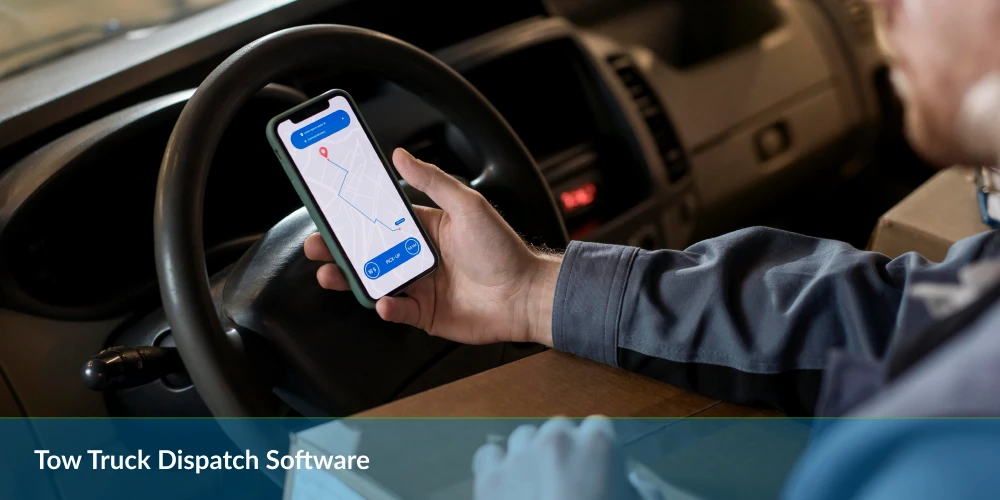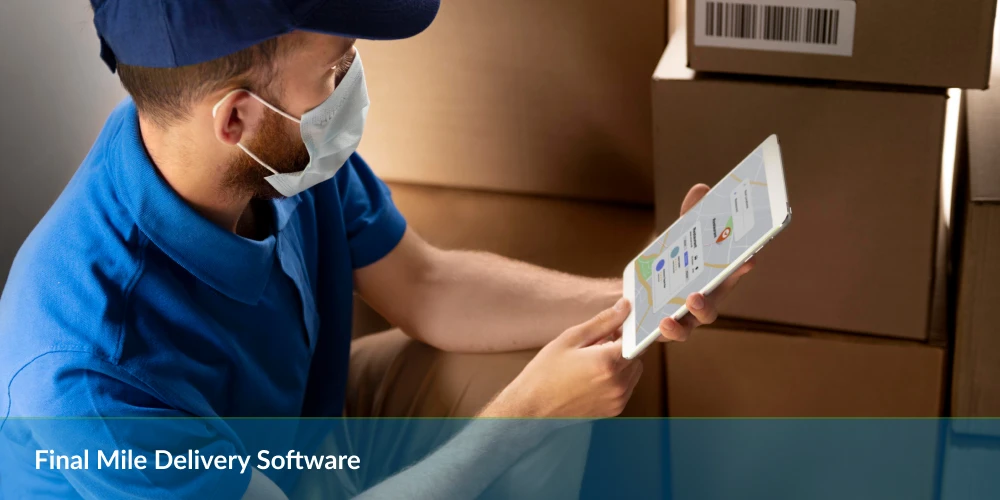Table of Contents
Tow truck dispatch software streamlines the complex operations involved in towing services. By leveraging technology to enhance communication and management, this software is the central hub for dispatching, tracking, and coordinating tow trucks and their operators. Its comprehensive feature set encompasses an array of functionalities designed to optimize workflows and improve service delivery.

Through tow truck dispatch software, vehicle tracking and fleet management tools ensure real-time visibility of assets, fostering prompt response times and efficient route planning. The work order management capability also simplifies job assignment and tracking, automating processes for greater accuracy and accountability.
Another significant component, customer engagement, and communication tools, facilitates transparent client interactions, fostering trust and satisfaction through updates and direct communication channels. Overall, tow truck dispatch software transforms the coordination of towing activities into a seamless and manageable process.
Key Features of Tow Truck Dispatch Software
In the fast-paced world of towing services, ownership of efficient tools is crucial. Tow truck dispatch software streamlines the payment process, allowing easy transactions and improved accounts receivable management. With built-in web tracking, dispatchers can monitor truck locations in real time, enhancing operational efficiency.
Moreover, the software’s usability ensures that even those less tech-savvy can navigate its features easily. As a Software as a Service (SaaS) solution, it offers flexibility, while its compatibility with virtual machines enhances performance across various devices.
Key features such as automated invoicing, text messaging for quick communication, and comprehensive reporting capabilities allow towing companies to stay organized and efficient. Integration with your website enables customer bookings directly through the platform, making it a holistic solution for modern towing operations.
Additionally, tow truck dispatch software simplifies complex logistical workflows and enriches towing operations with dynamic capabilities.
Real-Time GPS Tracking and Telematics Integration
Modern tow truck dispatch software incorporates real-time GPS tracking, granting dispatchers and managers visibility over the fleet’s locations and movements. This integration of telematics data supports informed decision-making and enhances the coordination of roadside assistance and recovery services.
Mobile App Functionality for On-the-Go Management
With mobile app functionality, drivers and technicians access vital job information directly from their devices. This digital connection facilitates seamless communication between the dispatch center and fleet, ensuring timely updates and task management.
Automated Dispatching to Minimize Errors
Automated dispatching systems provide optimized routing and job allocation, reducing manual oversight and errors. The software assesses availability, location, and workload to distribute calls effectively and efficiently.
Customizable Solutions for Unique Business Needs
Every towing company has distinctive requirements; therefore, tow truck dispatch software offers customizable solutions. Adaptability allows companies to tailor the software to their operational processes, job types, and customer service protocols.
- Real-time tracking ensures optimal fleet management and prompt customer service.
- Mobile apps bridge communication gaps and allow for real-time updates from the field.
- Automated dispatching streamlines operations and mitigates the risk of human error.
- Customizable features mean businesses can configure the software to their specific logistics and workflow demands.
Transform Your Towing Operations: Unveiling the Advantages of Dispatch Software
Dispatch software elevates towing service providers above traditional coordination and communication methods. Towing businesses experience a seamless transformation marked by substantial improvements in operational efficiency.
Instantaneous Boost in Response Times Enhances Customer Relations
Towing companies witness a remarkable enhancement in response times after implementing dispatch software. This software streamlines dispatching, allowing dispatchers to assign the nearest tow trucks swiftly. Prompt service invariably increases customer satisfaction, fostering loyalty and encouraging positive reviews.
Optimization of Resources Cuts Operating Expenses
Optimization is a significant outcome with the use of dispatch software. Companies manage their fleets more effectively, ensuring drivers and vehicles are employed to their fullest potential. Resource optimization, in turn, is synonymous with decreased operating costs & fuel consumption drops, and idle times are minimized.
Enhancing Communication and Coordination
Tow truck dispatch software is the nerve center for communication within towing operations. By facilitating the exchange of information, this technology ensures dispatchers, drivers, and customers stay connected throughout the service process.
Show How Dispatch Software Serves as a Communication Hub
Dynamic communication is the foundation of any successful towing service. Dispatch software aggregates conversations, dispatch details, and essential data in a single, accessible location. This consolidation allows for transparent and efficient communication channels that streamline the towing process.
Real-Time Updates for Dispatchers, Drivers, and Customers
The provision of real-time updates is a critical feature. Dispatchers gain a comprehensive view of fleet positions and service statuses, allowing them to make informed decisions quickly. Drivers receive instant notifications on new assignments, changes to existing ones, or emergency calls. Customers benefit from this real-time transparency, obtaining live status updates on their service requests and fostering trust and satisfaction.
Integrating with Communication Platforms for Seamless Collaboration
Integration with existing communication platforms enhances the software’s effectiveness. Dispatch software supports a seamless flow of information by interfacing with platforms such as email, text messaging, and specialized apps. This integration fosters collaboration, not just within the towing company but also with external stakeholders.
- Direct lines of communication between dispatchers and drivers reduce response times.
- Automated customer notifications deliver timely service updates and feedback opportunities.
- Synchronized data eliminates the need for redundant communication, minimizing discrepancies.
Effective communication and coordination, driven by comprehensive dispatch software, transforms the operational capabilities of towing companies, yielding improved customer experience and enhanced operational efficiency.
The Importance of Technology Integration
Tow truck dispatch software becomes transformative when seamlessly integrated with existing systems. This integration facilitates efficient data flow and fosters a cohesive operational environment. The consequence is a streamlined process from initial customer contact to job completion and follow-up.
Integration with GPS and Telematics for Efficient Routing
Linking dispatch software with GPS and telematics devices equips towing operations with dynamic routing capabilities. Drivers receive optimal paths to incident locations, reducing response times and fuel consumption. These systems track vehicle locations in real-time, enabling dispatchers to manage fleets precisely.
Software Compatibility with On-Board Diagnostics (OBD)
Compatibility with OBD allows dispatch software to access critical vehicle data, enhancing fleet managers’ decision-making. This feature monitors vehicle health, predicts maintenance needs, and avoids potential downtimes. Real-time diagnostics data alert operators of immediate concerns, ensuring prompt attention to mechanical issues.
Excellence in Towing Through Automation and Error Reduction
The integration of automation within tow truck dispatch software streamlines dispatch processes significantly. Automation accelerates task completion and enhances efficiency when manual oversight becomes a bottleneck. Dispatch software, equipped with automation capabilities, assigns towing requests to drivers without delay, factoring in numerous variables such as location, availability, and the type of assistance required.
Automating Routine Tasks and Dispatch Assignments
Automation transforms the dispatching landscape by taking over repetitive and time-consuming tasks. This process ensures that drivers are promptly and efficiently assigned to service requests and guarantees that each case is routed to the most suitable respondent. This judicious task allocation reduces response times and enhances customer satisfaction.
Using Software to Support Decision-Making and Avoid Mistakes
Tow truck dispatch software serves as a decision-support tool that minimizes human error. By analyzing large data sets and suggesting optimal decision paths, the software supports dispatchers in making informed choices. This reduces the likelihood of mistakes due to human oversight or fatigue and ensures that quality standards are consistently met.
- Customized dispatch rules embedded in the software ensure the decision-making process aligns with business policies and customer expectations.
- Data-driven insights provided by the software eliminate guesswork and enable a more strategic deployment of resources.
Deploying tow truck dispatch software unlocks a more organized, reliable, and proficient dispatch system. Automating key operations minimizes human error and propels businesses towards higher operational excellence.
Real-Time Information: A Game Changer in Towing Operations
Real-time information reshapes the way towing operations function. Access to current information allows for swift decision-making adapted to the unfolding reality on the roads. Accumulating real-time data is paramount as it drives the strategic execution of tasks and dramatically alters response times.
The Impact of Having Up-to-Date Information on Operations
A dispatch system endowed with real-time capabilities refines operational efficiency. It ensures that drivers can navigate and adapt to dynamic road conditions. Dispatchers gain the power to reroute tow trucks, avoiding sudden traffic congestion or accidents directly, reducing wait times and fuel consumption. This immediate adjustment of strategies aligns with customer expectations for prompt service delivery.
How Real-Time Information Improves Customer Transparency
Equipping customers with real-time updates about the whereabouts of their requested service vehicle elevates trust and satisfaction. Towing operations that disclose tracking data empowers customers, who can plan their time efficiently while awaiting assistance. As a result, real-time information fosters a transparent business-customer relationship and strengthens the company’s reputation in the market.
Choosing the Right Dispatch Software: Cloud-Based vs. On-Premise
When tow truck companies evaluate dispatch software, deciding between cloud-based and on-premise solutions is pivotal. These two dispatch solutions have distinguishing characteristics that can significantly affect business operations.
Compare and Contrast the Two Types of Dispatch Solutions
Cloud-based dispatch software offers a model where resources are delivered over the Internet. Users can access the platform from anywhere, provided they have an internet connection. Conversely, on-premise software requires installation on local servers and is managed by IT staff. Users typically access the system from within the business’s network.
Advantages and Limitations of Each Approach
- Scalability: Cloud-based platforms easily scale with a business’s growth without the need for significant hardware investment. At the same time, on-premise solutions may require additional server capacity.
- Control: On-premise software allows companies full control over their systems and data, whereas cloud-based solutions entrust the service provider with maintenance and data storage.
- Customization: On-premise options may offer deeper customization for specific business needs. Cloud software usually updates more frequently with improvements and new features but may limit the degree of customization.
Security, Accessibility, and Cost Implications
Security concerns also distinguish the two. Cloud services typically provide robust security measures that comply with industry standards. However, the responsibility for data safety partly lies with the third-party provider. On-premise setups require businesses to implement their security protocols, placing the onus entirely on them to protect their data.
Accessibility is notably superior with cloud-based software since the service’s nature allows for device-agnostic and location-independent access. Meanwhile, on-premise software can be accessed only within the office or through a virtual private network (VPN).
Costs also diverge significantly. Cloud-based software generally operates on a subscription model with ongoing costs, typically including support and updates without additional expenses. On-premise software might involve higher upfront costs for licenses and hardware. Still, it can result in lower long-term costs if the infrastructure can be maintained without substantial upgrades.
Choosing between cloud-based and on-premise dispatch software for tow truck operations requires carefully reviewing a company’s specific needs. Considering these critical differences enables businesses to make informed decisions that align with their long-term strategies and operational preferences.
Streamline Towing Operations: Implement Dispatch Software Effectively
Successful software implementation is a multi-layered process tailored to specific organizational requirements. Certain actions will ensure a smooth transition and maximized return on investment for those in the towing industry looking to enhance their operational efficiency through tow truck dispatch software.
A Tailored Approach to Dispatch Software Implementation
Begin by evaluating the unique intricacies of your towing operations. What are the typical scenarios your dispatchers and drivers encounter? How can software solutions address these specific challenges? Recognition of these needs is instrumental in selecting features that best align with your operational goals.
Training: Empowering Your Team for Success
Intensive training is paramount once a suitable tow truck dispatch software is selected. A well-informed team adept at navigating new software can fully leverage its functionalities, reducing response times and improving customer service. Provide comprehensive training and support to ease the learning curve and ensure adoption of the new system.
Encourage feedback sessions where employees can voice any difficulties or suggest further training on specific features. These sessions can also act as collaborative spaces for sharing best practices and techniques learned during individual experiences with the software.
Ongoing Support and Evaluation
Implementing dispatch software is not a one-off event but an ongoing process of adjustment and improvement. Set up a reliable support system to address technical issues promptly. Monitor the software’s impact on operational efficiency periodically, allowing you to spot areas that require fine-tuning or additional training for your team.
- Organize pre-implementation meetings to align goals and expectations with your team.
- Create a detailed rollout plan that includes milestones, responsibilities, and timelines to maintain momentum and measure progress.
- Focus on data integrity by ensuring all information entered into the system post-implementation is accurate and up-to-date.
- Use interactive simulations during training to help staff familiarize themselves with real-world scenarios.
With attention to detail and continuous engagement with your team, tow truck dispatch software can catalyze remarkable operational advancements in your towing business.
Analyzing the Cost-Benefit of Dispatch Software for Your Towing Company
Whether to integrate tow truck dispatch software involves a comprehensive analysis of the costs and benefits. The scales tip differently based on company size and their respective operational intricacies. Reducing overheads, such as requiring less administrative staff and eliminating manual dispatch methods, offers a quick return on investment (ROI) for small towing operations. Large operations may look at such software to streamline complex logistics and enhance large fleet management, potentially leading to significant savings and increased customer service quality.
ROI Considerations for Small vs. Large Operations
- Small Operations: Smaller companies often benefit from dispatch software by improving response times and dispatch accuracy. This can lead to higher customer satisfaction and increased repeat business, key drivers in boosting revenue.
- Large Operations: For larger companies, these tools can manage a vast array of tasks across a larger scale, affecting ROI through improved asset utilization and reducing unnecessary fuel consumption and labor costs.
Regardless of size, organizations should regard dispatch software as an investment in future efficiency and customer satisfaction rather than a mere current expense. Enhanced metrics and reporting capabilities offer insights that assist in making informed decisions, directly improving bottom-line results over time.
Long-Term Financial and Operational Benefits
Over the long term, the financial and operational dividends of integrating tow truck dispatch software become increasingly evident. With dynamic routing and real-time updates, companies can significantly decrease mileage and fuel costs while boosting the number of service calls completed daily. Moreover, automating and optimizing schedules results in higher productivity and more effective human resource employment.
Furthermore, these systems can contribute to maintenance schedules, ensuring that trucks and equipment are serviced timely and averting unexpected breakdowns and expensive repairs. As a result, the fleet’s life expectancy may be extended, translating into long-term cost savings and operational efficiency improvements.
Gauging the cost-benefit of tow truck dispatch software demands thoughtful consideration of the initial investment and the potential for streamlined operations and revenue enhancements. Companies looking to stay competitive recognize that the judicious use of such software and its myriad capabilities is a pathway to sustainable growth and a robust customer service presence.
Customize Your Edge: Dispatch Software Tailored for Your Towing Operations
Every towing service operates with its unique challenges and customer needs. Understanding that a one-size-fits-all approach doesn’t suit the varied demands of the towing industry is crucial. Customizing tow truck dispatch software is not merely an option; it enhances efficiency, boosts customer satisfaction, and sharpens competitive edge.
Identifying Key Features Specific to Your Services and Customers
Diverse operational scopes call for distinct functionalities in dispatch software. Urban towing companies might prioritize traffic navigation features, while rural services may focus on off-road capabilities. To thrive in a competitive market, aligning the software’s functionalities with the unique service features will encourage customer loyalty and operational efficiency.
Involving Stakeholders in the Customization Process
Engagement with drivers, dispatchers, and even customers during the customization phase can unveil insights that have yet to be apparent. Their hands-on experience can highlight practical features and streamline the dispatch process. Their involvement will ensure that the finalized software solution comprehensively addresses the specific requirements of various stakeholders, guaranteeing higher adoption rates.
- Proficiency in customization delivers a product that speaks to the heart of a towing business’s operations.
- By pinpointing the features that resonate with specific service provisions and client expectations, businesses position themselves to maximize resource deployment.
- Consultation with stakeholders during customization guarantees software evolution alongside business growth, ensuring its relevance over time.
Businesses invest in dispatch software for its current utility and potential to evolve with the company. The right software, molded to a business’s operations, culture, and client interactions, becomes an invaluable asset. Customization bridges the pivotal services of towing providers with the uniqueness of those they serve.
Fleet Maintenance and Compliance Through Software
Fleet maintenance and adherence to legal standards are upgraded with dedicated tow truck dispatch software. Software solutions enable efficient management of vehicle servicing schedules, ensuring that every tow truck is in optimal condition and reducing the chances of on-road breakdowns. Automated scheduling features guarantee that maintenance is always noticed and vehicles are serviced appropriately.
With the integration of automated maintenance scheduling, tow trucks receive timely attention, leading to extended vehicle lifespans and improved road safety. Managers receive alerts for upcoming maintenance tasks, which facilitates proactive vehicle care.
Beyond streamlining maintenance tasks, tow truck dispatch software provides robust record-keeping capabilities indispensable for compliance and auditing. During inspections or audits, easily accessible maintenance records, driver logs, and other regulatory documentation form a comprehensive paper trail demonstrating compliance with industry regulations.
The software’s ability to track and document all necessary information, from service histories to inspection reports, transforms it into a vital asset for towing companies. This record-keeping precision allows businesses to meet and exceed regulatory standards, fostering trust and reliability among clients and regulatory bodies.
- Facilitates regular maintenance checks, avoiding costly repairs and downtimes
- Ensures adherence to maintenance schedules through real-time alerts
- Helps maintain clear and audit-ready records for all fleet activities and maintenance procedures
The Future of Dispatch Software: AI and Machine Learning
Artificial intelligence (AI) and machine learning advancements are reshaping the tow truck dispatch software landscape. Integrating these technologies offers an evolutionary leap in service coordination and management.
Predictive Analytics for Demand Forecasting and Resource Allocation
By harnessing the power of predictive analytics, dispatch software can forecast demand surges and guide the distribution of resources accordingly. This ensures fleets are optimally positioned for future service calls, maximizing efficiency and response times.
AI-Enabled Chatbots for Enhanced Customer Service
AI-enabled chatbots represent a significant stride in customer interaction, providing immediate assistance and engagement. These sophisticated systems can answer inquiries, initiate service requests, and provide real-time updates to customers, elevating the towing experience to new heights.
Key Takeaways
Enhanced Efficiency and Response Times: Tow truck dispatch software significantly improves operational efficiency by automating dispatch processes, optimizing routes, and providing real-time vehicle tracking. This leads to faster response times, reduced operational costs, and enhanced customer satisfaction.
Real-Time Communication and Updates: The software facilitates seamless communication between dispatchers, drivers, and customers. Real-time updates and mobile app functionality ensure that all parties stay informed, leading to better coordination and a more transparent service experience.
Customizable and Scalable Solutions: Dispatch software offers customizable features to fit specific business needs and scalable options to grow with the company. This adaptability allows towing companies to tailor the software to their unique operational demands and expand as needed.
Data-Driven Decision-Making: Integrating analytics and predictive tools within dispatch software allows companies to leverage data for strategic decision-making. This capability helps forecast demand, optimize resource allocation, and improve overall business performance.
Security and Compliance: Data security and regulatory compliance are crucial for tow truck dispatch software. Implementing robust security measures, adhering to industry standards, and maintaining accurate records for compliance purposes protect sensitive information and foster trust with clients and regulatory bodies.
Conclusion
The incorporation of dispatch software will significantly enhance towing operations, transforming the efficiency and reliability of services offered. Towing service providers thereby stand to gain from exploring software solutions, recognizing the strategic investment it represents for their business.
Integrating key features like real-time information tracking, automation, and improved communication channels reduces human error. This step redefines fleet management, ensuring vehicles are optimally deployed and customers receive prompt, informed service.
Software solutions tailored to your business needs enable a more streamlined and secure operation. Data is safeguarded, and compliance with regulations is simplified, minimizing the risk of costly violations. The future of towing hinges on technology adaptation, with cloud-based resources and advancements like AI positioning businesses at the forefront of industry standards.
Fleet maintenance becomes less burdensome when managed through sophisticated dispatch software, allowing for timely interventions and minimizing downtime. Analyzing cost-benefit ratios will often reveal the long-term financial gains of implementing such solutions, notwithstanding the immediate improvements in service quality and customer satisfaction.
Transform your towing operations with NetworkON’s cutting-edge dispatch software. Request a demo to see how our solutions can streamline your processes and enhance customer experience.
Contact us today for detailed insights and to explore case studies showcasing the success of our software in the towing industry.
Frequently Asked Questions
What are the primary benefits of using tow truck dispatch software?
Tow truck dispatch software streamlines operations by automating dispatch processes, optimizing routes, and providing real-time vehicle tracking. Key benefits include improved response times, reduced operational costs, enhanced customer satisfaction, and efficient fleet management.
How does real-time tracking work with dispatch software?
GPS and telematics integration facilitates real-time tracking, allowing dispatchers to monitor the location and status of each tow truck. This feature enables accurate route planning, prompt service, and effective coordination between dispatchers, drivers, and customers.
What are the differences between cloud-based and on-premise dispatch software?
Cloud-based dispatch software is accessed via the Internet and offers scalability, remote access, and ongoing updates. On-premise software requires local installation and management, providing more control and customization but potentially higher upfront costs and limited remote access.
How can tow truck dispatch software help with fleet maintenance and compliance?
Dispatch software supports fleet maintenance by automating service schedules, sending alerts for upcoming maintenance, and tracking vehicle health. It also helps with compliance by maintaining detailed records of maintenance activities, inspections, and regulatory documentation, simplifying audits, and ensuring adherence to industry standards.





Alexis R. Ware
"This article clearly illustrates how tow truck dispatch software modernizes towing operations by improving coordination, reducing response times, and enhancing overall service quality. The practical examples help readers understand how technology can transform traditional workflows. I’ve also read a similar article: https://mobisoftinfotech.com/resources/blog/transportation-logistics/importance-real-time-vehicle-tracking-transporters that discusses transportation visibility platforms for transporters. It offers useful insights into how enhanced visibility and tracking support better planning, execution, and decision‑making across transportation networks."